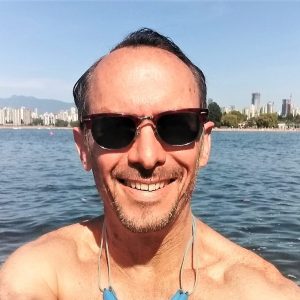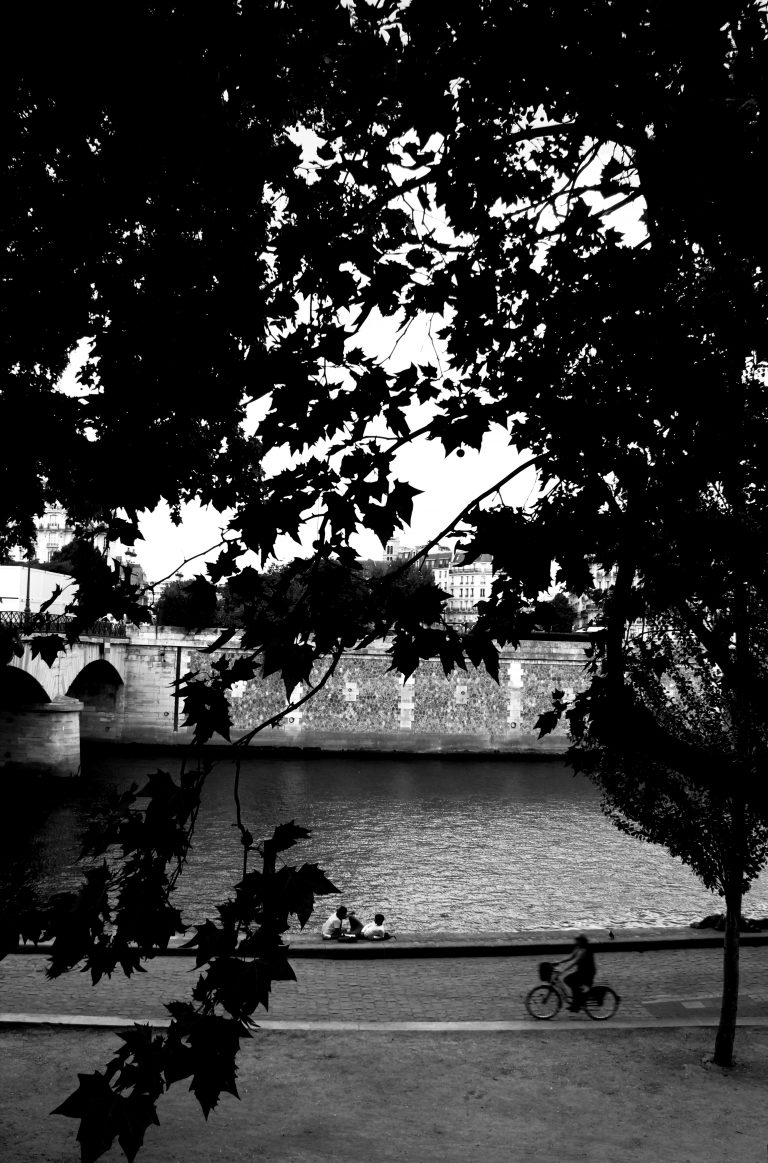 A little bit about me: I was born just north of San Diego, California. I went to UC Berkeley for undergraduate work, double-majoring in biochemistry and economics – I wasn’t sure at the time if I wanted to make molecules or money. After a lot of thought, doing undergraduate research, and taking graduate courses in chemistry, I opted to make molecules because if I ever gave that up, I could always make money whereas if I chose the money option, I would never have a chance to make a molecule. So I went south to UCLA for my Ph.D. where I synthesized new oligonucleotide-phenanthroline-copper chelates that could inhibit viral transcription and oxidatively damage viral DNA. For my postdoc, I moved to Paris (one of my favorite places) and worked in a CNRS lab associated with the famous Jardin de Plantes where the Curies and the Becquerels discovered radioactivity. As a postdoctoral fellow, I worked to discover the first-ever sequence specific ribonuclease mimic. After spending nearly five years in Paris, I took a position at UBC in 2000 and have been here ever since.
A little bit about me: I was born just north of San Diego, California. I went to UC Berkeley for undergraduate work, double-majoring in biochemistry and economics – I wasn’t sure at the time if I wanted to make molecules or money. After a lot of thought, doing undergraduate research, and taking graduate courses in chemistry, I opted to make molecules because if I ever gave that up, I could always make money whereas if I chose the money option, I would never have a chance to make a molecule. So I went south to UCLA for my Ph.D. where I synthesized new oligonucleotide-phenanthroline-copper chelates that could inhibit viral transcription and oxidatively damage viral DNA. For my postdoc, I moved to Paris (one of my favorite places) and worked in a CNRS lab associated with the famous Jardin de Plantes where the Curies and the Becquerels discovered radioactivity. As a postdoctoral fellow, I worked to discover the first-ever sequence specific ribonuclease mimic. After spending nearly five years in Paris, I took a position at UBC in 2000 and have been here ever since.
I’ve always appreciated the challenge of doing something new and being the first to do it. It’s not just the competition that drives me, it’s the fun of thinking that we’ll do something that the world would like to know about and we’ll be the first to see it. As a postdoc in 1995, I set out to make a prototype “smart drug” that would hydrolyze viral mRNA. This involved synthesizing chemically functionalized modified nucleoside triphosphates that would endow catalytic nucleic acids with more protein-like functionality. These went into a combinatorial selection that required mastery of molecular biology enzymes and a high degree of randomness. As if from nowhere, I planned to select and evolve a new catalyst that would achieve what 30 years of rational design hadn’t. It was a bit like watching life evolve in real time but not as quickly as I hoped for the evolution experiment took nearly 3 years of trial and error to make sure the enzymes would evolve a semi-synthetic DNA catalyst that might eventually be an antiviral drug. When I finally captured the catalyst, it was Bastille Day: As the fireworks were exploding over the Arc de Triomphe and while the rest of the world was partying outside, I was seeing my own scientific fireworks in a basement lab – so much better than watching the real fireworks with a million others on the Champs Elysees (remind me to tell you the joke about the science grad who finds a talking frog).
While this work launched my scientific career at UBC, since 2000, I’ve diversified and expanded my research. Still, we are always working on new challenges that blend synthetic methodologies and targeted oriented synthesis and have expanded into many other projects (see my publications). For example we completed the first total synthesis of amanitin; I feel so blessed to have had a confluence of will, funding, and student energy to accomplish this. On the day we co-injected the natural product with our synthetic product and showed HPLC co-elution (along with coincident NMR, CD, and IC50 data) a real thrill came: we had the final data needed to convince the world that we had completed the first total synthesis of this notorious toxin. This was definitely a career highlight of many! My lab is pretty fearless when it comes to doing chemistry to address problems in biology while making headway in synthetic methods to get at new molecules.
Research should be about creation of new knowledge and applications. The discovery process is something I think a lot about. In my opinion it takes 4 skills: perspicacity, creativity, tenacity and speed – with practice and dedication, these can be learned and trained. Learning technical training is important too. But inspiring young scientists to be part of the creative process – to think out of the box, to read the literature and ask, “what if” and “why not” and then design experiments to make new molecules that will be of interest for methodology, pharmacology, and fundamental knowledge – that is still what drives me to this day. Ideas might be cheap but good ideas are not like fine wine – they don’t get better with age, instead they get worked on. With this in mind, we strive for the honor to be first, hoping that the wind of a good idea is at our back. I really like this job, especially when I can inspire a new generation to see how fun research can be (even if doing it right takes a lot of work). Actually some of my best moments have been with undergrads. If what you’re reading here here resonates and want to join my team of hardworking, out-of-the-box thinkers, please contact me. It takes a special team of students who lose the fear and become obsessed with the race to be first. After all, anything is possible, it’s always only up to each of us; as the French would say, “il n’y a qu’a”, or maybe it’s the “human isotope”. At the same time, we all learn from each other and have some fun along the way.
When I’m not in lab, I’m usually in the kitchen trying to create something tasty after accessing some of the best ingredients that you can find at Granville Island Public Market. I’ve been baking bread for a while (email me if you want my easy bread recipes). While cooking, I’ll be listening to music – rockabilly, reggae-ska, bel-canto Italian opera, blue grass, or world music. If I had to choose between an expensive bottle of Bordeaux or a day on the slopes at Whistler, I’ll choose the wine. But I will take the family to the slopes in late winter and I’ll ski a bit and try to have the same wine at night! Honestly though, I prefer the beaches of Vancouver during the summer (often swimming at Kits – see above). In winter, I’d rather be in Waikiki. I am also a dad and try to find balance in family life.
My other hobby is photography – see below – and if I had a second life, I’d be trying to walk in the footsteps of Brassai, Doisneau and Cartier-Bresson; it’s not hard to capture the beauty of Paris – you just need to keep walking while keeping your eyes open and your camera ready – kinda like research to be honest – be observant and keep moving. Happy to show more of this collection that I’m putting together.

I also enjoy swimming, playing tennis, chess and stud poker, writing, and will try to read from time to time. A few reads I highly recommend are: “How to Fly a Horse” by Kevin Ashton, “The Last Lecture” by Randy Pausch, “Of Human Bondage” by W. Somerset Maugham, “Lady L” by Romain Gary, “Unbroken: A World War II Story of Survival, Resilience, and Redemption” by Laura Hillenbrand, and “The Rise and Fall of the Third Reich” by William Shirer.
Let me know your thoughts! Stay in touch.
Peace out – DMP